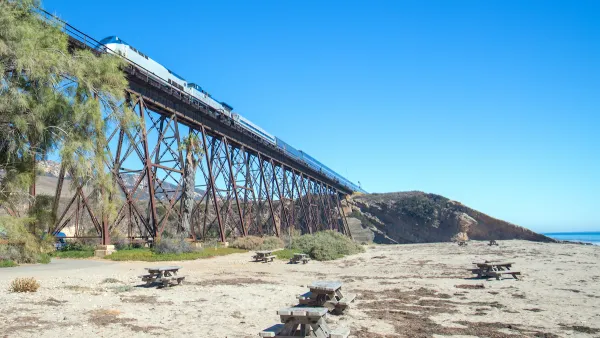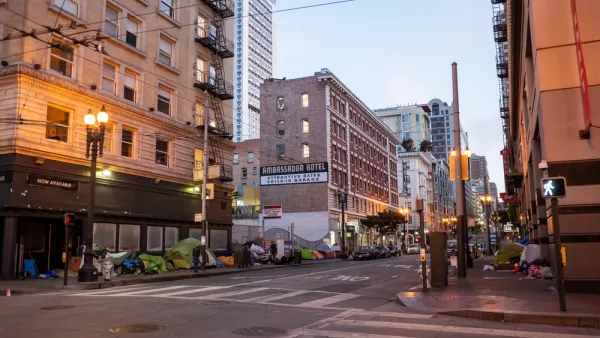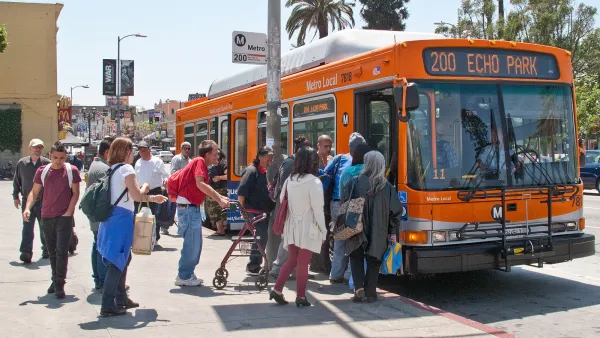California Watch, a project of the nonprofit Center for Investigative Reporting, evaluated the 2009-11 American Community Survey and determined that CA's 'drive-alone' rate to work was 73%. Joanna Lin points the finger at free parking as chief cause.
To be sure, California Watch did not rate reasons for solo commuting - Lin only explores the 'free parking' explanation by interviewing UCLA Professor Don Shoup. Clearly a major reason would be the time benefit as well - as in all California counties, solo commuting was quicker than carpooling or public transit. Lin doesn't include data for walking or biking. Commute modes and times for all 58 California counties are included in the study. Guess which county had the lowest drive-alone rate?
"Californians who refrain from driving to work alone typically have longer commutes. On average, solo drivers spent 25 1/2 minutes getting to work, the census survey showed. Carpoolers took just over half an hour to get to their jobs, and public transit riders commuted nearly 47 minutes to work."
Shoup points to free parking at work.
"One explanation for persistently high rates of solo drivers, said Donald Shoup, a professor of urban planning at UCLA, is free parking."
"If you can park free at work, it's an invitation to drive to work alone. And almost everybody who does drive to work has this invitation," he said.
"A study Shoup conducted 15 years ago for the state Air Resources Board found that employers who offered cash-out programs saw solo driving to work drop by 17 percent, carpooling increase by 64 percent, walking and biking grow by 33 percent, and transit ridership jump by 50 percent.
The cash-out program, however, is not well known and not widely used, Shoup said.
San Francisco residents were the least likely in the state to commute by driving alone, with 37.5 percent who did. One in 5 reported having no vehicles available to them, a much higher rate than the statewide average of 3.6 percent.
By contrast, in Los Angeles County, the 7.2 percent of residents who rode public transit to work commuted an average of nearly 48 minutes (compared to San Francisco's 37.3 minutes). Driving alone to work took Los Angeles residents an average of 27.4 minutes."
In the California Watch article on the survey, Lin notes that "Californians' commuting habits have not changed much in recent years. They drive, carpool and ride public transit at about the same rates they reported in the 2006-8 American Community Survey, and their journeys to work are about the same duration."
Thanks to Len Conly
FULL STORY: Free work parking drives solo driver rate

Analysis: Cybertruck Fatality Rate Far Exceeds That of Ford Pinto
The Tesla Cybertruck was recalled seven times last year.

National Parks Layoffs Will Cause Communities to Lose Billions
Thousands of essential park workers were laid off this week, just before the busy spring break season.

Retro-silient?: America’s First “Eco-burb,” The Woodlands Turns 50
A master-planned community north of Houston offers lessons on green infrastructure and resilient design, but falls short of its founder’s lofty affordability and walkability goals.

Test News Post 1
This is a summary

Analysis: Cybertruck Fatality Rate Far Exceeds That of Ford Pinto
The Tesla Cybertruck was recalled seven times last year.

Test News Headline 46
Test for the image on the front page.
Urban Design for Planners 1: Software Tools
This six-course series explores essential urban design concepts using open source software and equips planners with the tools they need to participate fully in the urban design process.
Planning for Universal Design
Learn the tools for implementing Universal Design in planning regulations.
EMC Planning Group, Inc.
Planetizen
Planetizen
Mpact (formerly Rail~Volution)
Great Falls Development Authority, Inc.
HUDs Office of Policy Development and Research
NYU Wagner Graduate School of Public Service




























